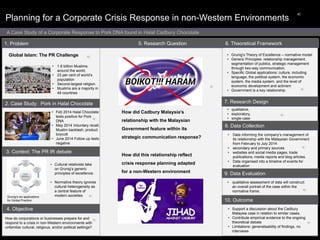Manika naidoo s3416447 research proposal presentation, planning for a corporate crisis response in non western environments
- 1. What are the ambitions of Open Labor’s membership? How do these features characterise social networked movements as a product of globalisation; (Construction of meaning in a world increasingly influenced by computer mediated communication) 2. Content analysis of Open Labor’s Website How is Open Labor representing the ambitions of its membership base (as defined above) Planning for a Corporate Crisis Response in non-Western Environments A Case Study of a Corporate Response to Pork DNA found in Halal Cadbury Chocolate 1. Problem 2. Case Study: Pork in Halal Chocolate • Grunig’s Theory of Excellence – normative model • Generic Principles: relationship management, segmentation of publics, strategic management through two-way communication. • Specific Global applications: culture, including language, the political system, the economic system, the media system, and the level of economic development and activism • Government is a key relationship 8. Data Collection 1.6 billion Muslims around the world, representing 23 per cent of people worldwide and making Islam the world's second-largest religion. Muslims are a majority in 49 countries and millions more Muslims live as minorities elsewhere. 3. Context: The PR IR debate Grunig’s six applications for Global Practice • Cultural relativists take on Grunig’s generic principles of excellence. • Normative theory ignores cultural heterogeneity as a central feature of modern societies What are the ambitions ooff OOppeenn LLaabboorr’’ss mmeemmbbeerrsshhiipp?? How did Cadbury Malaysia’s relationship with the Malaysian Government feature within its strategic communication response? How did this relationship reflect crisis response planning adapted for a non-Western environment Global Islam: The PR Challenge 4. Objective How do corporations or businesses prepare for and respond to a crisis in non-Western environments with unfamiliar cultural, religious, and/or political settings? 6. Theoretical Framework • Data informing the company’s management of its relationship with the Malaysian Government from February to July 2014 • secondary and primary sources • websites and social media pages, trade publications, media reports and blog articles. • Data organised into a timeline of events for evaluation 9. Data Evaluation • qualitative assessment of data will construct an overall portrait of the case within the normative frame. 10. Outcome 5. Research Question • 1.6 billion Muslims around the world, • 23 per cent of world’s population • Second-largest religion. • Muslims are a majority in 49 countries • Feb 2014 Halal Chocolate tests positive for Pork DNA • May 2014 Voluntary recall, Muslim backlash, product boycott • June 2014 Follow up tests negative 7. Research Design • qualitative, • exploratory, • single-case • Support a discussion about the Cadbury Malaysia case in relation to similar cases, • Contribute empirical evidence to the ongoing theoretical debate • Limitations: generalisability of findings, no interviews

